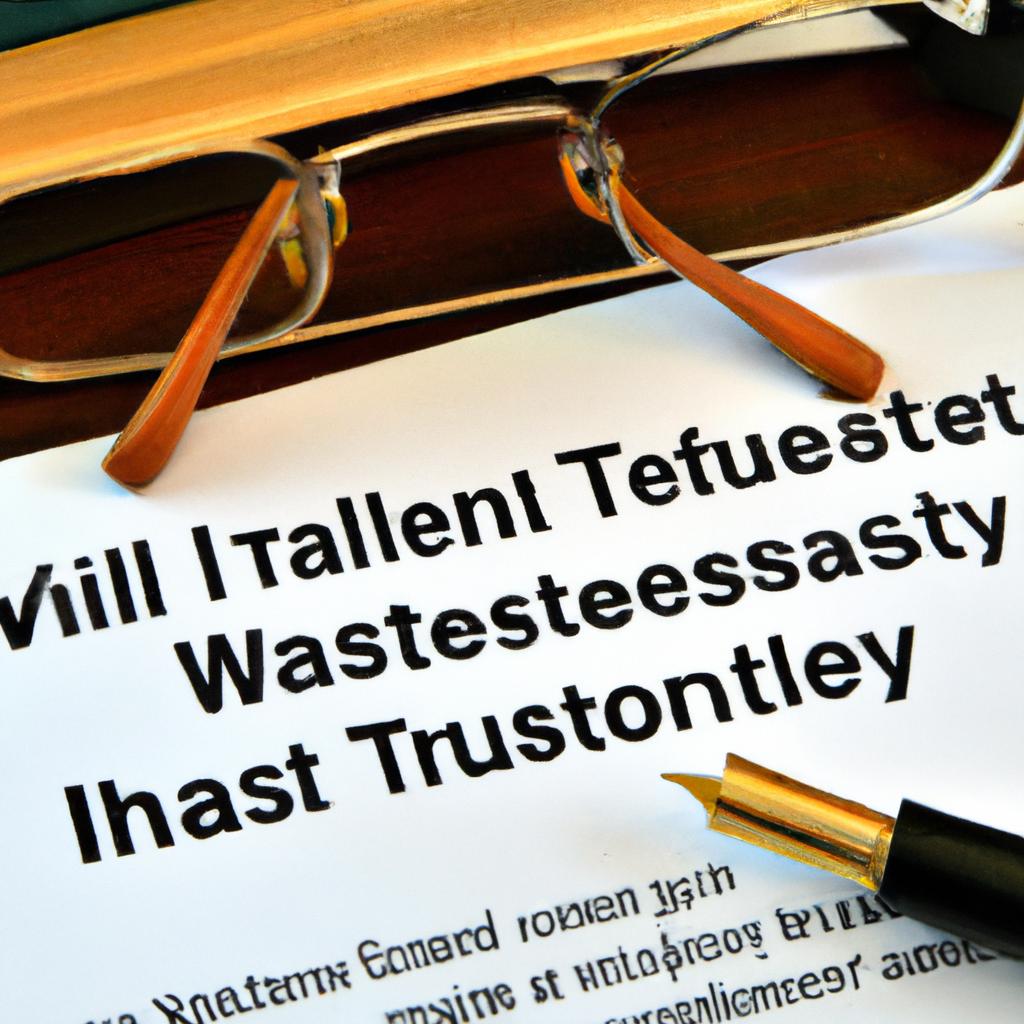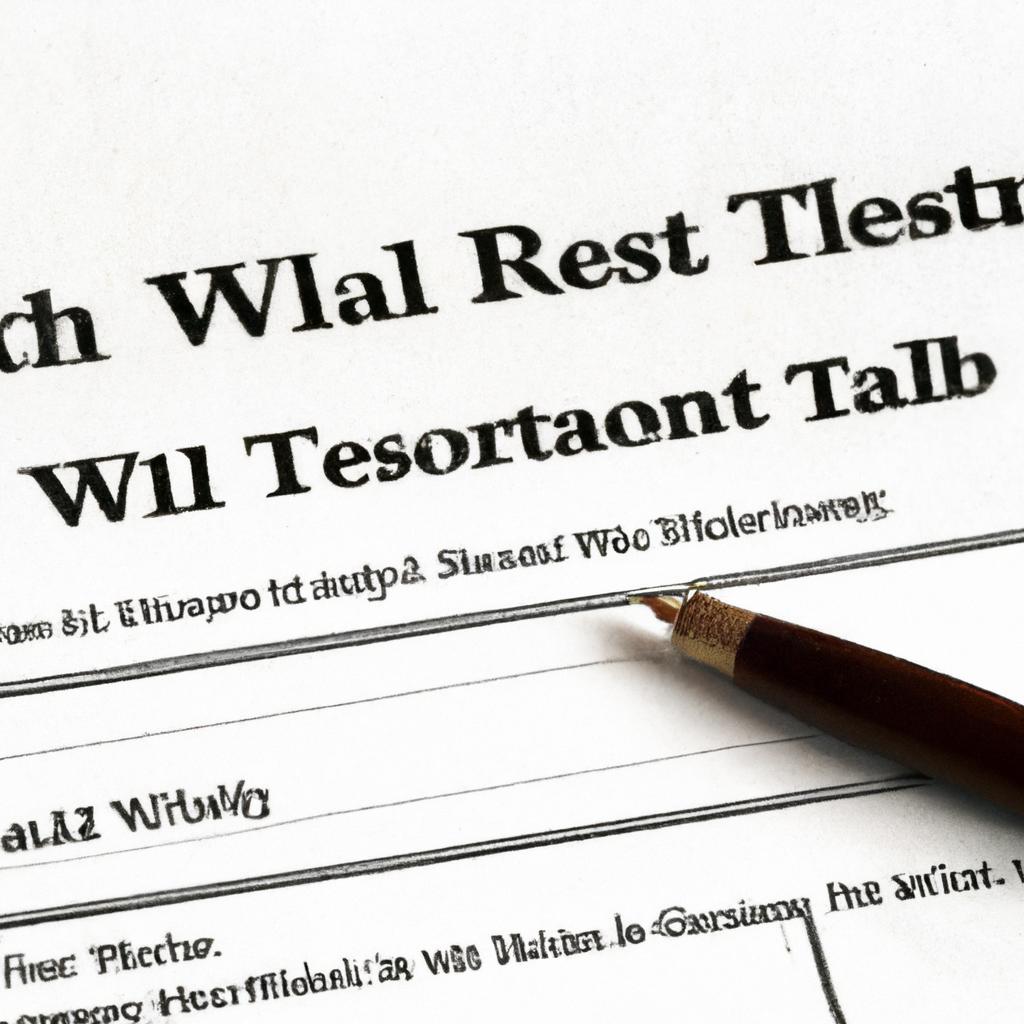In the intricate web of estate planning, a crucial role is often held by the will trustee. This pivotal figure is tasked with overseeing the distribution of assets as outlined in a last will and testament. Here at Morgan Legal Group in the heart of New York City, we understand the importance of selecting a competent and trustworthy individual to serve as a will trustee. Join us as we delve into the intricacies of this vital role and explore the responsibilities and requirements associated with being a will trustee.
Understanding the Role of a Will Trustee
When it comes to the distribution of assets in a will, the role of a will trustee is crucial. A will trustee is responsible for carrying out the wishes outlined in the deceased person’s will. This individual is entrusted with the duty to manage and distribute the assets of the estate to the designated beneficiaries.
is important for anyone involved in estate planning. A will trustee must act in the best interests of the beneficiaries and ensure that the assets are distributed according to the instructions laid out in the will. This requires careful attention to detail, legal knowledge, and a strong sense of responsibility.

Key Responsibilities and Duties of a Will Trustee
As a Will Trustee, you play a crucial role in ensuring that the wishes outlined in a person’s will are carried out effectively and responsibly. Below are some key responsibilities and duties that you must adhere to:
- Manage and Administer Trust Assets: One of the primary duties of a Will Trustee is to manage and administer the assets held within the trust in accordance with the terms outlined in the will.
- Communicate with Beneficiaries: It is essential to maintain open communication with beneficiaries, keeping them informed of the trust’s status and any relevant updates.
- Make Distributions: As a Will Trustee, you are responsible for making distributions to beneficiaries as outlined in the will and in accordance with legal requirements.
| Responsibility | Duty |
|---|---|
| Asset Management | Manage and administer trust assets in accordance with the will |
| Communication | Maintain open communication with beneficiaries |
| Distributions | Make distributions to beneficiaries as outlined in the will |

Choosing the Right Will Trustee for Your Estate Plan
When it comes to estate planning, selecting the right individual to act as your will trustee is a crucial decision that should not be taken lightly. A will trustee is responsible for managing and distributing your assets according to your wishes outlined in your will. This individual should be trustworthy, responsible, and capable of carrying out the duties assigned to them.
It is important to carefully consider who you choose as your will trustee, as this person will play a significant role in ensuring that your estate is handled properly after your passing. To make an informed decision, consider the following factors:
- Trustworthiness: Your will trustee should be someone you trust implicitly to carry out your wishes and act in the best interests of your beneficiaries.
- Responsibility: The individual should be organized, detail-oriented, and capable of handling the financial and administrative tasks associated with managing an estate.
- Communication: A good will trustee should be able to communicate effectively with beneficiaries, legal advisors, and other relevant parties to ensure a smooth and efficient estate distribution process.

Legal Requirements and Considerations When Appointing a Will Trustee
When appointing a Will trustee, it is essential to understand the legal requirements and considerations involved in this important decision. A Will trustee is a person or entity designated to manage the assets and distribute them according to the instructions outlined in the Will. It is crucial to carefully select a reliable and trustworthy individual or institution to ensure that the wishes of the deceased are carried out effectively and responsibly.
Some key include:
- Ensuring the trustee is of legal age and has the mental capacity to fulfill their duties
- Choosing someone who is financially responsible and capable of managing assets
- Considering potential conflicts of interest or personal relationships that may compromise the trustee’s impartiality
Q&A
Q: What is a will trustee?
A: A will trustee is a person or entity appointed to manage and distribute the assets of a deceased individual according to the terms of their will.
Q: What are the responsibilities of a will trustee?
A: The responsibilities of a will trustee include overseeing the administration of the deceased’s estate, ensuring that debts and taxes are paid, and distributing assets to beneficiaries as outlined in the will.
Q: How is a will trustee different from an executor?
A: While an executor is specifically named in the will and carries out the wishes of the deceased, a will trustee is appointed by the executor or court to oversee the overall management and distribution of the estate.
Q: Can a family member serve as a will trustee?
A: Yes, a family member can serve as a will trustee, as long as they are willing and able to fulfill the responsibilities required of the role. However, it is important to consider any potential conflicts of interest that may arise.
Q: How does one choose a will trustee?
A: The process of choosing a will trustee typically involves selecting a trustworthy and responsible individual who is capable of handling financial matters and following the wishes of the deceased as outlined in the will. It is crucial to discuss this decision with the potential trustee and seek their consent before naming them in the will.
Closing Remarks
In conclusion, a will trustee plays a crucial role in ensuring that your final wishes are carried out accurately and fairly. By entrusting someone with the responsibility of managing your assets and distributing them according to your instructions, you can have peace of mind knowing that your loved ones will be taken care of after you’re gone. So, whether you choose a family member, friend, or professional advisor to be your will trustee, make sure to carefully consider your decision and communicate your wishes clearly to avoid any potential confusion or disputes. Ultimately, having a trusted will trustee by your side can help make the estate administration process smoother and ensure that your legacy is preserved for generations to come.
 What is a Will Trustee: Understanding the Role, Responsibilities, and Benefits
What is a Will Trustee: Understanding the Role, Responsibilities, and Benefits
When creating a will, one of the key decisions you’ll have to make is who will be the trustee. A trustee is a person or entity responsible for managing and distributing the assets in a trust according to the terms outlined in the trust document. They have a fiduciary duty to act in the best interests of the beneficiaries and handle the trust assets with care and diligence.
A trustee is an essential part of the estate planning process, and their role can greatly impact the success and effectiveness of your will. In this article, we will delve into the details of what a will trustee is, their responsibilities, and the benefits of having one.
Who Can Be a Will Trustee?
A will trustee can be any person or entity who is legally competent and able to fulfill the duties assigned to them. This can include family members, friends, or professional entities such as banks, attorneys, or trust companies.
It’s important to consider not just the person’s relationship to you, but also their ability to carry out the responsibilities of a trustee. Choosing the right trustee is crucial to ensure that your wishes are carried out in the most effective way possible.
Understanding the Role of a Will Trustee
A will trustee plays a critical role in the trust administration process and, as such, must have a thorough understanding of the responsibilities and duties involved. Some of the key roles of a will trustee include:
1. Managing Trust Assets
One of the most important duties of a trustee is managing the assets held in the trust. This can include making investment decisions, selling assets, and handling any income generated by the trust. It is the trustee’s responsibility to ensure that the assets are managed in a way that benefits the beneficiaries.
2. Distribution of Assets
In accordance with the terms of the trust document, the trustee is responsible for distributing the trust assets to the beneficiaries at the appropriate time. This can be a one-time distribution or done gradually over time, depending on the specific instructions outlined in the trust.
3. Communication with Beneficiaries
Trustees have a legal obligation to keep the beneficiaries informed about the status of the trust, including any changes in assets or distributions. Regular and transparent communication is crucial to maintain trust and avoid disputes later on.
4. Handling Potential Conflicts of Interest
As a fiduciary, a trustee must act in the best interests of the beneficiaries and not their own interests. This means avoiding conflicts of interest and always putting the beneficiaries first. Trustees must also disclose any potential conflicts of interest to the beneficiaries to maintain transparency and trust.
5. Record Keeping and Reporting Responsibilities
Trustees are also responsible for keeping accurate records of all the trust’s transactions and providing regular reports to the beneficiaries, as well as filing any necessary tax documents on behalf of the trust.
Why Choose a Will Trustee?
There are several benefits to having a will trustee in place, including:
1. Expertise and Knowledge
Professional trustees, such as trust companies or attorneys, have the necessary expertise and experience to handle complex trust matters. This can be especially beneficial for high net worth individuals or those with complicated estates.
2. Neutrality and Impartiality
A trustee who is not a family member or friend can provide impartial decision-making, avoiding any potential familial conflicts that may arise. This can also be beneficial when there are multiple beneficiaries with conflicting interests.
3. Financial Security and Protection for Beneficiaries
Having a trustee in place can provide a layer of protection for the beneficiaries. It ensures that the assets are managed and distributed in a responsible manner, minimizing the risk of financial mismanagement or fraud.
4. Continuity and Peace of Mind
By choosing a trustee, you can ensure that your wishes are carried out even after your passing. This can provide peace of mind, knowing that your assets will be managed and distributed according to your wishes.
Tips for Choosing the Right Will Trustee
Choosing the right trustee is crucial to the success of your estate plan. Here are some tips to keep in mind when selecting a trustee:
1. Consider the person’s relationship to you and their ability to handle the responsibilities of a trustee.
2. Consider their financial expertise, especially if the trust is complex.
3. Discuss your expectations and responsibilities with potential trustees before selecting them.
4. Choose alternate trustees in case the primary trustee is unable to fulfill their duties.
5. Re-evaluate your trustee choice periodically to ensure they are still the best fit for your trust.
Real-World Example
Sarah and John had been married for 30 years and had two adult children, Emily and Michael. When creating their wills, they appointed Emily as the trustee of their trust, with Michael as her alternate. However, during the trust administration process, Emily became overwhelmed with the responsibilities and asked Michael to take over as trustee. This decision caused tension and conflict between the siblings, resulting in a lengthy and expensive legal battle. If Sarah and John had chosen a professional trustee or discussed their expectations and responsibilities with Emily beforehand, this conflict could have been avoided.
In conclusion, a will trustee holds a pivotal role in the estate planning process. They have important responsibilities that can greatly impact the success and effectiveness of your will. Consider all factors carefully when choosing a trustee, and regularly review and communicate with them to ensure they are fulfilling their duties and responsibilities properly. This will give you and your beneficiaries peace of mind, knowing that your wishes will be carried out when the time comes.


